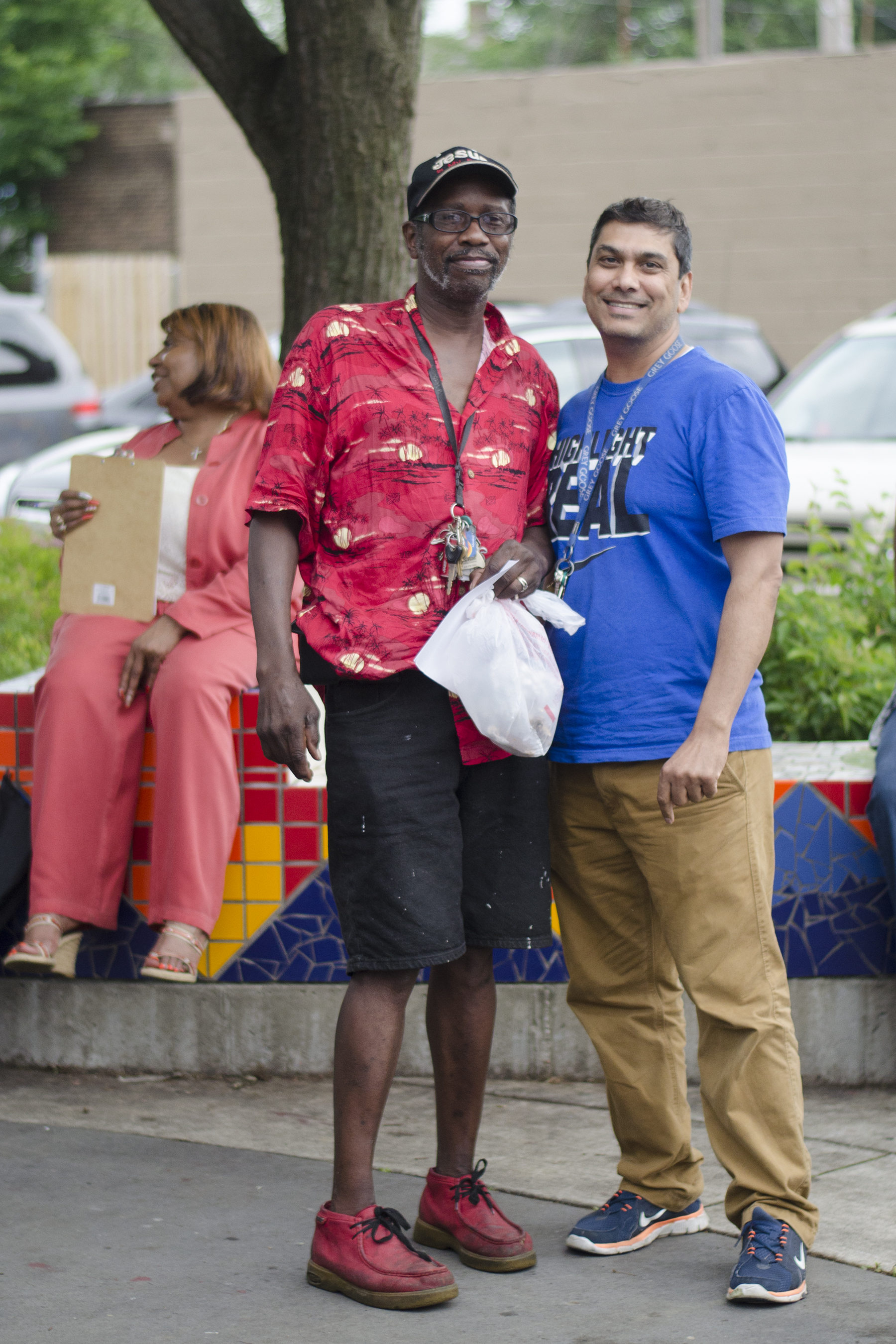It’s raining lightly as I walk Vinny to the public safety summit in Art and Soul of Buckeye Park.
A few of the 50 or so attendees gathering in the park grumble about moving inside, but John Hopkins and Commander Deon McCaulley of the Cleveland Police Department are firm about staying put. They say our presence here sends a message to would-be criminals that neighborhood residents are taking notice.
Vinny and I take a seat in the back, near a woman who turns and gives him a smile and a scratch on the snout.
“Cute puppy,” she says. “Boy, right? He’s probably trying to see all the girls.”
I find out her name is Doreen and she lives on E. 120th Street.
There are familiar faces here, too: Reggie's sitting second row, center; CJ from CJ’s Famous Angus is next to him. D’Angelo strolls up a few minutes late with his youngest daughter.
Commander McCaulley takes the podium. He’s a big guy with graying hair and a booming, friendly voice.
He says the police know there are crime problems in Buckeye - especially with drugs - but they need our help to stop it.
“Every time you see something bad happen out here and you don’t call the police, every time you choose to stay inside instead of walking the streets, you’re tolerating crime,” Commander McCaulley says. “We don’t want you to be tolerant.”
That’s his general message throughout the meeting: Understanding mixed with calls to action. Several times, he repeats his direct office number so people can call him with problems.
The rain becomes heavier. Umbrellas snap open. A few people move to sit under a tree, but no one leaves.
tempers flare
The meeting proceeds amiably until about halfway through. That’s when a man sitting near me raises his hand and brings up the so-called “drug boys” who hang out on E. 117th and Buckeye.
“I want to know why I have to put up with these kids standing out on the street acting threatening,” the man says. “I didn’t move here from Chicago to have to keep dealing with that.”
It’s like someone’s flipped a switch. The whole crowd starts talking at once - to each other, to the Commander. Everyone, it seems, has something to say about the drug boys.
Here is the disorder John told me he’d been hoping to avoid. He stands up and shouts for people to quiet down and listen. After a few seconds, they do.
The Commander’s tone turns sober. “Look, we know about these kids,” he says. “That corner’s been a hot spot for at least five years now. We’ve got cars patrolling the area -”
“They know when you’re coming and they just take off out of the way!” Reggie shouts back. I’m surprised it’s taken him so long to chime in. “Soon as you’re gone, they’re back again.”
The commander stays calm. “And that’s why I’ve got plainclothes officers out, too. But we can’t just go up and frisk them without a warrant.”
“So what are we supposed to do?”
“Call us whenever you see something specific" -- sightings of actual deals, for example, or flare-ups of violence. "Make it anonymous if you need to.”
A man sitting beside Reggie speaks up. He has an accent I can’t place -- Eastern European, maybe. I find out later he owns One-Stop Liquor & Beverage on E. 116th and Buckeye, one of Reggie's other employers. “You’re telling us to call police,” he says. “I call five, six times a day. They tell me I’m being a nuisance.”
The exchange continues in similar circles for another 10 minutes or so. People want the kids out of their neighborhood; to accomplish that, the Commander needs specific information that could get informants in trouble.
Dirt-Biking on buckeye
Eventually, someone asks about another problem - the growing number of young men roaring up and down Buckeye Road on dirt bikes - and the discussion moves on.
As the meeting wraps up, CJ raises his hand for the first time.
“Has anyone thought about how these kids could channel what they’re doing into something productive?” he asks. “These boys on dirt bikes - have you seen them? They’re talented. They’re popping wheelies, they’re jumping over stuff. How about we organize some kind of event where they could compete, do what they love to do...”
I’m already a big fan of CJ’s, and my appreciation for him now soars even higher.
Unfortunately, the crowd’s breaking up and his question is half-lost in the shuffle. The Commander says he likes CJ’s sentiment, but police can't encourage activities, such as dirt-biking, that explicitly break laws. (I'm unclear on the nuances here and need to do some more digging.)
Afterward, the rain has cleared, so I ask a few people what they thought of the meeting. Some people say they feel good, reassured.
Others say they’re dissatisfied, that they feel at a loss for what to do next.
The mood seems to be a mix of buoyant and uncertain.
“So. Five years?” I say to Seth as we walk home. “That’s how long our corner’s been a hotspot?”
It’s one of the most striking points of the meeting for me: The longevity of the problem at such a defined location. Before moving to Buckeye and becoming part of conversations like this one, I’d never realized the level of difficulty police have in making drug arrests, or how long a loosely rotating group of kids can evade the law.
In the street, we see a young man - early high school age, I’d guess - who’d been at the meeting but left before it ended. He’s roaring down Buckeye Road on a dirt bike, his mop of hair headbanded back off his forehead.
He pulls up to the sidewalk and disappears for a moment. Then he reappears, this time on foot.
We introduce ourselves and he says his name is Moe.
“You were at the public safety meeting just now, right?" I ask. "What’d you think?”
“It was OK," he says, friendly enough. "I was worried they’d start talking about dirt bikes.”
“Is that why you left?”
“Yeah.”
We chat a few more moments, then he drifts off.
My head's a jumble of thoughts. For residents of Buckeye, I wonder about the divisions between tolerance and caution, the desire to have a safe neighborhood versus the more basic desire to keep personally safe - by staying inside or not reporting crime for fear or retribution. It must be a difficult daily boundary to negotiate.
For the kids (mostly young men) who are breaking the law, I wonder what it must be like to feel criminalized even if your intent is not to cause harm. Moe, for example, was curious enough to check out the meeting - but left when he detected potential hostility. His absence seems like a missed opportunity.
Finally, for community leaders, how do you create events at which both "sides" feel invited? Is it even possible?
We turn onto our block.
For tonight, at least, the corner of E. 117th and Buckeye is empty.












